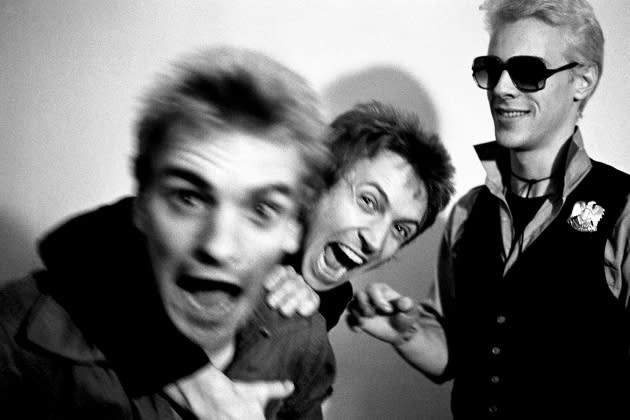Hear the Police’s Humble Beginnings on Stewart Copeland’s Rare ’Clown’s Revenge’ Demo
- Oops!Something went wrong.Please try again later.

The set list for the Police’s first concert consisted of seven songs, and drummer Stewart Copeland estimates they got through all of them in about six minutes. “We were fast,” he says. With the exception of “Landlord,” which Sting cowrote, and a cover of the Animals’ “It’s My Life,” Copeland tells Rolling Stone the songs were “all my concoctions.”
One of the set list’s curiosities is “Clown’s Revenge,” a charging prog-punk hybrid that sounds a bit like what X was doing around the same time in L.A., which Copeland wrote with his brother Ian. The Police never recorded it, but it was a staple of their early gigs. Stewart recently excavated a crude recording of the song that he cut with Ian while researching his upcoming book, Stewart Copeland’s Police Diaries (aka the Starving Years), which covers the years between 1976 and 1979 — roughly from their formation (rounded out at the time by guitarist Henry Padovani) through the release of Regatta de Blanc (home to “Message in a Bottle”). The book, which will come out this year, features copies of Copeland’s diary pages, handmade poster designs, and previously unpublished photos that give an inside account of how the group came together.
More from Rolling Stone
'He was 50 Years Old Going on Eight': Stewart Copeland on Taylor Hawkins' Childlike Joy
Sting Sells the Police, Solo Songwriting Catalog for Estimated $250 MiIllion
Copeland has enjoyed reflecting on the Police’s beginnings — just after he left the prog-rock group Curved Air — and how he got the band on its feet with long-forgotten songs like “Clown’s Revenge.” “The miracle is that when Sting first arrived in London, this and other crude renderings were the material that I played him as persuasion to join my band,” Copeland says. “And he joined!
“We didn’t yet have Sting songs to work with, just my two-chord tricks with lyrics so dumb that our singer couldn’t bring himself to articulate them clearly,” he continues. “[They were] basically bass riffs with yelling. So another miracle was that we stuck together through thin and thinner and then Andy [Summers] joined us, casting aside his lucrative session career to join two fake punks long before we knew what Sting could do. In the beginning it wasn’t so much the music that bonded us, since we hadn’t even figured that out yet; it was just musical instinct that convinced us that we were in the right company. We bonded with each other before we figured out what music to play.”
Thanks to his diaries, he still has vivid memories of when and how he recorded the demo of “Clown’s Revenge” at the London home of former Curved Air drummer Florian Pilkington-Miksa on July 14, 1976. “[Curved Air vocalist] Sonja Kristina, my brother Ian, and I were living there and used a storeroom to set up our gear and write/record songs,” he says. “From Curved Air, I had a leftover Yamaha ‘Leslie’ cabinet with reverb and recorded onto Florian’s Revox A77 tape machine — that I eventually bought from him. I soon discovered that I could play lightning guitar licks and be Eric Clapton by recording my solo with the tape at half-speed. When we moved to Mayfair [in London] and the punk thing broke out, Ian wrote this lyric and sang it into my trusty Shure SM57 microphone.” Seventy-three days later, Stuart met Sting and within a few months formed the Police.
So why did the Police stop playing “Clown’s Revenge” and how did it foreshadow the trio’s future music? “Because Sting started writing actual songs,” Copeland says. “My theory is that when Sting started writing songs for us, Henry’s restricted guitar vocabulary forced [Sting] to conceive his songs in a more distilled musical language. Henry forced him to keep it simple so that when Andy showed up, Sting had mastered a simpler form but could now have richer harmony.”
Copeland says that the experience of going back to his diaries for the book reminded him of many more recordings from the group’s “starving years” that he hopes to release. “On them are the demos of songs that I played for Sting, band rehearsals with Henry Padovani, the night Andy first jumped on stage to jam with us at the Marquee, more band rehearsals with Andy and many other audio mementos,” he says. He’ll be sending some of those out to people who pre-order the book. Copeland says the book is “the truest account of the Police’s beginning and early days — I’ve got the receipts.”
Best of Rolling Stone
